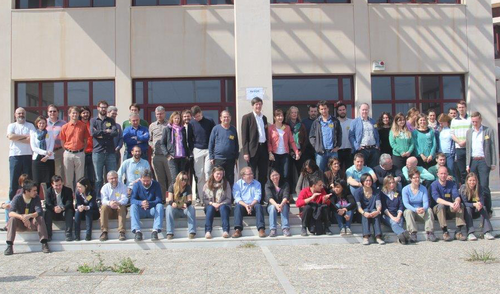

The "Building the European Biodiversity Observation Network" EU BON General Meeting took place between 30 March - 3 April 2014 in Heraklion on Crete, to present major project results and set objectives for the future. The meeting was preceeded by a review paper recently published in the open access journal Nature Conservation, to point out EU BON researchh interests and objectives for the future of biodiversity protection.

This is a group photo of the participants in the recent EU BON General Meeting in Crete, Greece.
The 2014 General Meeting brought together keynote speakers Jörg Freyhof (GEO BON, Executive Director), Marc Paganini (European Space Agency), Jerry Harrison (UNEP-WCMC) with the entire EU BON consortium to discuss collaborations between the project and other important initiatives in the areas of earth observation, particularly in remote sensing and in situ approaches to biodiversity data collection, as well as in the use and analysis of biodiversity data for forecasting and scenario building, and environmental policy.
"The high potential for satellite Earth Observations to support biodiversity monitoring is growing but is yet to be fully realised. The recent efforts of GEO BON, supported by the GEO Plenary and the CBD Conference of the Parties, to define a set of minimum essential observational requirements to monitor biodiversity trends will give considerable impetus for space agencies and for the remote sensing community to focus their work on a small set of well defined earth observations products that will serve the needs of the biodiversity community at large. In that context ESA is firmly engaged in supporting the development of these emerging Essential Biodiversity Variables (EBVs). EU BON together with ESA can be pioneers in the early development and demonstration." comments Marc Paganini, European Space Agency, on the future collaboration between the two initiatives.
The world's biodiversity is in an ongoing dramatic decline that despite conservation efforts remains unprecedented in its speed and predicted effects on global ecosystem functioning and services. The lack of available integrated biodiversity information for decisions in sectors other than nature conservation has been recognized as a main obstacle and the need to provide readily accessible data to support political decisions has been integrated into the CBD's "Strategic Plan for Biodiversity 2011–2020" and the Aichi targets. The recently published EU BON review paper points out how the project will use its potential to improve the interaction between citizens, science and policy for a better future of biodiversity protection.
EU BON aims to enable decision makers at various levels to make use of integrated and relevant biodiversity information adapted to their specific requirements and scales. Disparate and unconnected databases and online information sources will be integrated to allow improved monitoring and evaluation of biodiversity and measures planned or taken at different spatial and temporal scales. This requires strong efforts not only with regard to technical harmonization between databases, models, and visualization tools, but also to improve the dialogue between scientific, political, and social networks, spanning across several scientific disciplines as well as a variety of civil science organizations and stakeholder groups.
The project is focusing mainly on the European continent but contributes at the same time to the globally oriented Group on Earth Observations Biodiversity Observation Network (GEO BON), which itself contributes to the Group of Earth Observation System of Systems (GEOSS). EU BON will build on existing information infrastructures such as GBIF, LifeWatch and national biodiversity data centres in Europe, and will integrate relevant biodiversity data from on-ground observations to remote sensing information, covering terrestrial, freshwater and marine habitats.
Original Source:
Hoffmann A, Penner J, Vohland K, Cramer W, Doubleday R, Henle K, Kõljalg U, Kühn I, Kunin WE, Negro JJ, Penev L, Rodríguez C, Saarenmaa H, Schmeller DS, Stoev P, Sutherland WJ, Ó Tuama É, Wetzel FT, Häuser CL (2014) Improved access to integrated biodiversity data for science, practice, and policy - the European Biodiversity Observation Network (EU BON). Nature Conservation 6: 49–65. doi: 10.3897/natureconservation.6.6498




 RSS news
RSS news Print this article
Print this article
